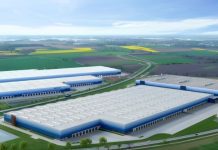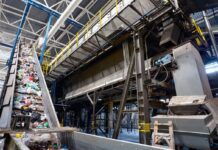
Samsara Eco has opened its first commercial-scale plant in Jerrabomberra, regional New South Wales, marking what the company describes as a major step forward in circular plastics manufacturing.
The Australian biotechnology firm said the new headquarters and plant will enable it to produce virgin-identical, low-carbon circular materials, including recycled nylon 6,6 and polyester, for use in apparel, packaging and automotive applications.
The facility houses EosEco, Samsara Eco’s enzymatic recycling technology that uses AI-designed enzymes to break down mixed plastics into raw materials that can be reused by brands.
It also includes expanded enzyme production capacity to accelerate research into recycling solutions for a broader range of plastics.
Paul Riley, CEO and founder of Samsara Eco, said the opening represented a significant moment for the company and the broader circular economy.
“The opening of Jerrabomberra is a proud milestone for us and the broader circular economy. In just four years, we’ve scaled from bench research through to pilot, demonstration, and now our first plant. This is a true tipping point for circularity, shifting circular materials from early-stage innovation to mainstream reality,” Riley said.
He added that brand demand and supportive regulatory frameworks are paving the way for growth. “Our new facility will help brands deliver circularity with the capacity to produce the equivalent of hundreds of thousands of garments annually,” he said.
Samsara Eco said the materials produced at Jerrabomberra will be incorporated into upcoming product lines for global partners such as lululemon, as well as pilot programs with brands in the textiles, automotive and packaging sectors.
The company is also conducting research projects, including work with The LYCRA Company on recycling spandex and with Deakin University under the Australian Government’s Trailblazer Universities Program.
Currently, only around 10 per cent of plastics are recycled globally, and less than 1 per cent of textiles are recycled into new textiles. Riley said Samsara Eco’s focus is on addressing these challenges.
“This isn’t just about building a plant. It’s about building a circular future where materials don’t have an end-of-life. Instead, they are infinitely recycled, reducing the world’s reliance on finite resources,” he said.
The Jerrabomberra facility also provides a platform for Samsara Eco’s planned nylon 6,6 commercial plant in Asia, designed with engineering partner KBR and scheduled to open in 2028. The 20,000-tonne facility will be the first of several international sites using the company’s technology.
“Our Jerrabomberra plant marks a significant milestone in Australia’s advanced manufacturing and circular economy journey,” Riley said.
“Our technology supports Australia’s net-zero targets while driving economic growth, resilience, and productivity. We’re creating an entirely new industry to unlock major export opportunities and bring new skills to market, while also helping to position Australia as a leader in circular technology and a global exporter of circular materials.”
The project has received backing from investors including Main Sequence, Temasek, Greycroft, and Hitachi Ventures. Carley Phillips, Principal at Greycroft, said the opening “marks an important step towards scaling circular materials and showcasing the power of technology to transform industries.”
Jan Marchewski, Associate at Hitachi Ventures, noted the company’s track record. “We’ve been deeply impressed by Samsara Eco’s ability to deliver every milestone on time and on budget – an extraordinary achievement for a deep tech company,” he said.
Phil Morle, Partner at Main Sequence, described the development as a milestone for Australian innovation.
“Samsara Eco opening its first plant for infinite plastic recycling in regional Australia is an exemplar of Australian ingenuity leading the world to create industries for the next generation of growth,” he said.



















